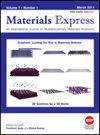聚亚胺2k (PEI2k)/超顺磁氧化铁(SPIO)纳米颗粒通过靶向c-MET和Ets-1抑制肝癌的发展
IF 0.7
4区 材料科学
Q3 Materials Science
引用次数: 0
摘要
研究n -烷基-聚乙烯亚胺2 kda稳定超顺磁性氧化铁(PEI2k/SPIO)纳米颗粒对小鼠肝细胞癌的治疗作用,并探讨其作用机制。培养高转移性HCC细胞,采用逆转录-定量聚合酶链反应(RT-qPCR)检测c-MET和Ets-1 mRNA表达。CCK-8检测细胞活力,流式细胞术检测细胞凋亡。建立肝癌动物模型后,通过尾静脉给药PEI2k/SPIO纳米颗粒和/或Ets-1抑制剂。采用EdU实验和流式细胞术检测各组细胞凋亡和增殖情况,并检测c-MET、Ets-1、MMP-2水平。HCC细胞c-MET上调,Ets-1下调。用PEI2k/SPIO纳米颗粒处理后,细胞和动物的c-MET表达降低,Ets-1表达增加。PEI2k/SPIO纳米颗粒显著抑制肿瘤生长,抑制细胞增殖,诱导细胞凋亡。此外,额外注射Ets-1可增强MMP-2的磷酸化活性,减轻PEI2k/SPIO对MMP-2表达的影响。众所周知,纳米技术可以提高输送效率,从而影响预后。本研究表明,PEI2k/SPIO纳米颗粒通过下调c-MET和生长因子,上调MMP-2和Ets-1抑制HCC细胞的恶性特征和肿瘤生长。本文章由计算机程序翻译,如有差异,请以英文原文为准。
Polyethylenimine 2k (PEI2k)/superparamagnetic iron oxide (SPIO) nanoparticle inhibits development of hepatocellular carcinoma through targeting of c-MET and Ets-1
This study investigates the efficacy of N-Alkyl-polyethylenimine 2 kDa–stabilized superparamagnetic iron oxide ((PEI2k/SPIO) nanoparticles on hepatocellular carcinoma (HCC) in mice and explored the underlying mechanism. Highly metastatic HCC cells were cultured and mRNA expressions of c-MET and Ets-1 were determined by Reverse transcription-quantitative polymerase chain reaction (RT-qPCR). Cell viability was detected by CCK-8 and apoptosis was assessed by flow cytometry. After establishment of animal model for HCC, the rats were administered PEI2k/SPIO nanoparticles and/or Ets-1 inhibitor through tail vein. Cell apoptosis and proliferation were then assessed by EdU experiment and flow cytometry, and the levels of c-MET, Ets-1, MMP-2 were measured as well. HCC cells presented up-regulated c-MET and down-regulated Ets-1. Treatment with PEI2k/SPIO nanoparticles resulted in decreased in c-MET expression and increased Ets-1 in both cells and animals. The PEI2k/SPIO nanoparticles significantly decreased cell proliferation and suppressed tumor growth, and induced apoptosis. Besides, additional injection of Ets-1 enhanced phosphorylation activity of MMP-2 and alleviated PEI2k/SPIO’s effect on MMP-2 expression. Nanotechnology is known to improve delivery efficiency and hence affect prognosis. This study elucidated that, PEI2k/SPIO nanoparticles suppressed malignant characteristics of HCC cells and tumor growth through down-regulation of c-MET and growth factors and up-regulation of MMP-2 and Ets-1.
求助全文
通过发布文献求助,成功后即可免费获取论文全文。
去求助
来源期刊

Materials Express
NANOSCIENCE & NANOTECHNOLOGY-MATERIALS SCIENCE, MULTIDISCIPLINARY
自引率
0.00%
发文量
69
审稿时长
>12 weeks
期刊介绍:
Information not localized
 求助内容:
求助内容: 应助结果提醒方式:
应助结果提醒方式:


